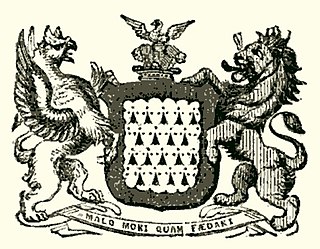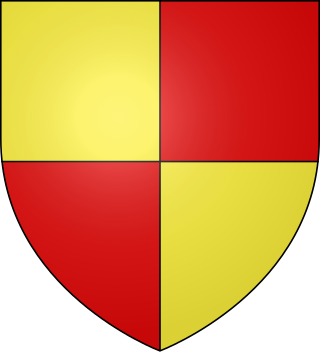Related Research Articles
The Lord High Chancellor of Ireland was the highest judicial office in Ireland until the establishment of the Irish Free State in 1922. From 1721 to 1801, it was also the highest political office of the Irish Parliament: the Chancellor was Speaker of the Irish House of Lords. The Lord Chancellor was also Lord Keeper of the Great Seal of Ireland. In all three respects, the office mirrored the Lord High Chancellor of Great Britain.
Alexander Plunket was an Irish statesman and judge of the fifteenth century.

Rowland FitzEustace, 1st Baron Portlester was an Irish peer, statesman and judge. He was one of the dominant political figures in late fifteenth-century Ireland, rivalled in influence probably only by his son-in-law Garret FitzGerald, the "Great" Earl of Kildare.

John Barnewall, 3rd Baron Trimleston, was an Irish nobleman, judge and politician. He was the eldest son of Christopher Barnewall, 2nd Baron Trimlestown and his wife Elizabeth Plunket, daughter of Sir Thomas Fitz-Christopher Plunket of Rathmore, Lord Chief Justice of the King's Bench in Ireland and his second wife Marian Cruise. He succeeded his father as 3rd Baron about 1513. His father, like most of the Anglo-Irish aristocracy, had supported the claim of the pretender Lambert Simnel to the English throne in 1487. After the failure of Simnel's rebellion, he received a royal pardon.
Walter Fitzsimon was a statesman and cleric in Ireland in the reign of Henry VII, who held the offices of Archbishop of Dublin and Lord Chancellor of Ireland.
Robert Preston, 1st Viscount Gormanston (1435–1503) was an Irish peer and statesman of the fifteenth century who held the offices of Deputy to the Lord Chancellor of Ireland and Lord Deputy of Ireland.

Sir Richard FitzEustace (c.1380–1445) was an Irish statesman who twice held the office of Lord Chancellor of Ireland.
Sir Robert FitzEustace (c.1420–1486) was an Irish landowner and politician of the fifteenth century.
Sir Robert Dowdall was an Irish judge who held the office of Chief Justice of the Irish Common Pleas for more than forty years. He is mainly remembered today for the murderous assault on him by Sir James Keating, the Prior of Kilmainham, in 1462.
Richard Delahide was an Irish judge of the sixteenth century, who held the offices of Chief Justice of the Irish Common Pleas and Chief Baron of the Irish Exchequer. His career was seriously damaged by the Rebellion of Silken Thomas, in which several members of his family played a leading part, and he was fortunate to escape permanent disgrace.
Clement Fitzleones, FitzLyons, or Leones was an Irish lawyer and judge. He held the offices of Serjeant-at-law (Ireland) and Attorney-General for Ireland and was briefly Deputy to the Chief Baron of the Irish Exchequer.
John Estrete, or Strete was an Irish judge, author, law lecturer and statesman of the late fifteenth century. He held the offices of King's Serjeant, Deputy Chief Baron of the Irish Exchequer, and Master of the Coinage of Ireland. He was a member of the Privy Council of Ireland. He wrote at least one legal textbook, Natura Brevium.
John Burnell was an Irish judge who held office as Chief Baron of the Irish Exchequer.

Gerald FitzGerald, 8th Earl of Kildare KG, known variously as "Garret the Great" or "The Great Earl", was Ireland's premier peer. He served as Lord Deputy of Ireland from 1477 to 1494, and from 1496 onward. His power was so great that he was called "the uncrowned King of Ireland".
Sir William FitzWilliam, of Windsor, Berkshire, was an Irish courtier and Member of Parliament in England. He was Chief Gentleman of the Privy Chamber to Edward VI of England; Deputy Chancellor of Ireland; Lieutenant of Windsor Castle; Keeper of Windsor Great Park and Lord Lieutenant of Berkshire.
The Brotherhood of Saint George was a short-lived military guild, which was founded in Dublin in 1474 for the defence of the English-held territory of the Pale. For a short time it was the only standing army maintained by the English Crown in Ireland. It was suppressed by King Henry VII in 1494, due to his suspicions about the Brotherhood's loyalty to his dynasty. It was not an order of knighthood, although some of its individual members were knights.
Sir Thomas Plunket (c.1440–1519) was a wealthy Irish landowner, lawyer and judge in fifteenth-century and early sixteenth-century Ireland. He held office as Chief Baron of the Irish Exchequer and Chief Justice of the Irish Common Pleas. After the change of the English royal dynasty in 1485, his loyalty to the new Tudor dynasty was deeply suspect, and he was involved in two attempts to put a pretender on the English throne. On each occasion he was disgraced, fined and removed from office; yet he had sufficient political influence to ensure his return to favour and high office.
Thomas Archbold, or Thomas Galmole was a goldsmith and silver worker, who also qualified as a lawyer, and rose to become a senior Crown official and judge in Ireland in the late fifteenth and early sixteenth centuries. He was Master of the Mint in Ireland for many years.
Patrick Burnell was an Irish judge and Crown official of the fifteenth century.
Sir James Keating was an Irish cleric and statesman of the fifteenth century. He was Prior of the Irish house of the Knights Hospitallers, which was based at Kilmainham, Dublin, and a member of the Privy Council of Ireland.
References
- ↑ Ball, F. Elrington (1926 ) The Judges in Ireland 1221-1921 London: John Murray Vol.1 p. 106
- ↑ Ball p.106
- ↑ Gilbert, J.T. "Roland FitzEustace" Dictionary of National Biography 1885-1900 Vol.18 p.53
- ↑ Ball p.106
- ↑ Ball p.106
- ↑ Gilbert p.53
- ↑ Ball p.186